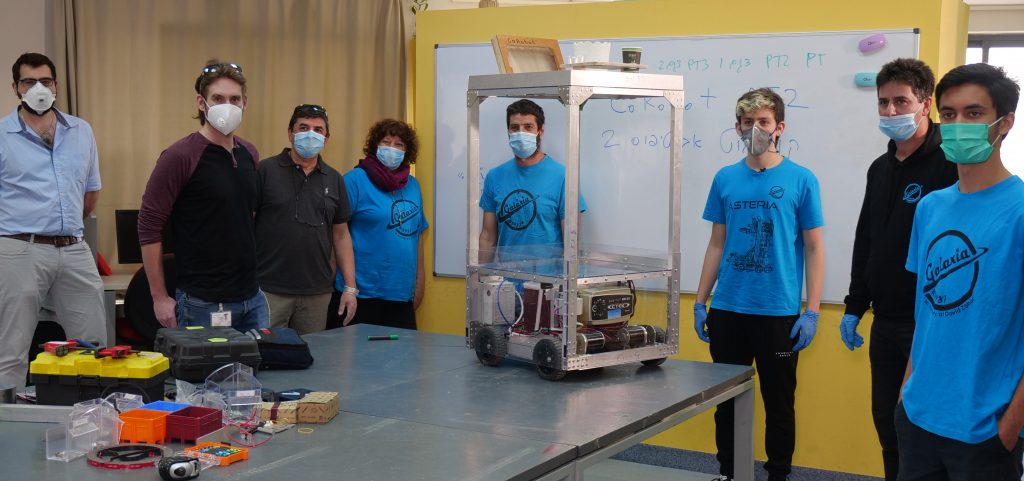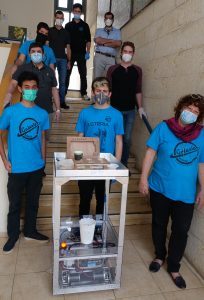COROBOT Care at Rambam Hospital
COROBOT to Provide Remote Medical Care to COVID-19 Patients at Rambam Health Care Campus
Students and alumni of the FIRST robotics program from the Reali School in Haifa, led by Prof. Gil Yudilevitch of Technion’s Faculty of Aerospace Engineering, have designed a robotic platform to be operated remotely by medical staff, reducing the risk of infection by COVID-19

All hands on deck! FIRST ISRAEL, led by Technion, runs hundreds of groups across the country totaling approximately 14,000 students between the ages of 6 and 18.
Over the last weeks, thousands of medical professionals have been forced to stop working after exposure to – or infection by – the novel Coronavirus. When a medical worker is diagnosed with the Coronavirus, the entire team must self-isolate for extended periods of time.
Safeguarding the health of medical workers has become a national priority.
Since medical professionals are on the front-line of the fight against COVID-19 and are the most exposed to the virus. Therefore, it is of critical importance to minimize their direct contact with patients where possible.
Prof. Michael Halbertal, Director General of the Rambam Health Care Campus, has been struggling with this challenge ever since the hospital’s Coronavirus Department was opened. He raised the problem with his predecessor Prof. Rafael Bayer and Technion VP for External Relations and Resource Development Prof. Alon Wolf, an expert in robotics. They discussed the need to develop a robot that would serve the Coronavirus patients and reduce the medical staff’s exposure to the virus.
Prof. Wolf, academic head of the FIRST robotics program in Israel, contacted the principal of the Reali School in Haifa, Dr. Yosi Ben-Dov. The Reali School has a vibrant robotics club – “Galaxia 5987 in memory of David Zohar” – that has taken part in FIRST championships in the US. From that point on, things moved swiftly and last week the robot they designed was presented to the Rambam medical team.

A FIRST at Rambam! A student-designed robotic platform to be operated remotely by medical staff, reducing the risk of infection by COVID-19
Prof. Yudilevitch joined the effort together with Profs. Ezri Tarazi and Reuven Katz. The first prototype fulfills the task of transporting supplies to and from the Coronavirus department. The robot is operated remotely by medical staff using a joystick or smartphone app, with the help of video cameras attached to the robot.
School principal Dr. Ben-Dov says that “in recent days we have been working very hard, while complying with the Ministry of Health’s guidelines. In less than one week, we developed a robot according to Rambam’s requirements. Kudos to the high school students and the alumni – some are in the army, some are Technion students and others have been laid off from work during the crisis – and of course to the parents who became involved and are supporting this essential project. I would also like to thank teachers Tirza Hochberg and Asaf Shulman, who spared no effort in helping with this important project, as well as Schnapp Batteries, which donated important components for the robot.”
According to Prof. Alon Wolf, “If the robot will successfully pass its installation at Rambam, in a relatively short amount of time we will be able to build more robots for Rambam and for similar departments in other Israeli hospitals. Then additional FIRST groups all over Israel will join the effort.”
“In the next stage, the robot will incorporate a communication system that will include a screen, camera, microphone, and speaker, and will be able to move from patient to patient and transmit information to the medical staff in real-time,” adds Prof. Gil Yudilevitch. “I hope that in the future we will add features that will help with the actual treatment, such as sensors that will check patients’ pulse rates and blood oxygen levels.”
About FIRST
FIRST is an international educational organization that uses robotics competitions to promote entrepreneurship and learning among children and youth. FIRST ISRAEL, led by Technion, runs hundreds of groups across the country totaling approximately 14,000 students between the ages of 6 and 18.


